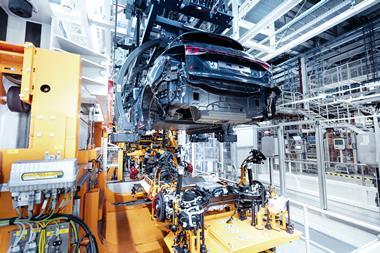Audi FAW NEV will manufacture mid-sized and full-sized PPE vehicles at the new factory, which has annual capacity for 150,000 vehicles and the batteries to power them

Audi has started assembling battery electric vehicles (BEVs) at a new plant in Changchun, China with FAW, beginning with the Q6L e-tron. The carmaker said it is the first plant in China to exclusively produce fully electric Audi vehicles based on its compact Premium Platform Electric (PPE) model, which was developed with Porsche.
The joint venture, Audi FAW NEV will manufacture mid-sized and full-sized PPE vehicles. Following the Q6L e-tron the plant will make the Audi Q6L Sportback e-tron. The PPE vehicles made in China differ from the international model having a longer wheelbase and interior features exclusive to the Chinese market.
The Changchun production plant has an installed annual production capacity of over 150,000 BEVs and also makes the batteries for those vehicles.
Audi said that it used digital twin technology to create the flexible production system, which is fully digitalised and automated. According to the carmaker, a 3D structure of the plant’s buildings based on building information modelling (BIM) was set up first, with real-time updates of the digital model in line with the construction.
That use of digital technology continues into day-to-day manufacturing and logistics, as well as maintenance, with all processes networked with each other via one single IT architecture using the S/4Hana cloud-based data system to store and share information throughout the plant. It is the first time that the IT architecture has been used by a VW Group company outside of Europe.
The Changchun body shop is automated with 800 robots, quality control is managed with visual recognition technology and there is an automated crane in the press shop to streamline operations.
Automated logistics
Audi also said the plant employs a driverless transport system and a 24-metre high warehouse that uses a fully automated storage and retrieval system. Furthermore, Audi is developing new automation technologies at its new plant and exploring the use of humanoid robots on the assembly line. Audi FAW NEV has a memorandum of understanding (MoU) with the Beijing Innovation Center of Humanoid Robotics and Ubtech Robotics to further explore the use of the technology. BMW and Mercedes-Benz are also looking at humanoid robotics applications in Europe.

To secure the time inbound supply of materials Audi FAW NEV aims to localise around 50% of its suppliers within a radius of 30km of the Changchun site and local government has established an exclusive business park for those suppliers with a view to attracting more business. It means the plant is projected to achieve a localisation rate of around 90%, according to Audi FAW NEV.
Sustainable production
To decarbonise operations at the plant Audi FAW NEV has installed solar panels across 320,000 sq.m of the facility’s roofs to supply energy and heating is sourced from thermal energy and gas from biomass. Audi said the plant recycles production waste and treats wastewater in a closed loop, while also using rainwater collection and reverse osmosis. The joint venture is also using a closed material loop for aluminium offcuts in the press shop.
Furthermore, the company said it is offsetting the carbon emitted by vehicles and activities, including in supply chain operations and manufacturing through voluntary projects carried out worldwide.
At this year’s Automotive Logistics and Supply Chain Mexico conference, Dieter Braun, head of supply chain at Audi, outlined how the transition to BEV making necessitated a more flexible approach to sustainable manufacturing which involves embracing new technologies such as automation and applying those technologies quickly, measuring the results and using them to stay competitive. Supply chain and manufacturing have to be closely aligned and logistics operations have to produce results that move the company forward, and not end up as wasted energy. Braun said logistics was a function of its supply chain organisation that added value and it was key to the success of the company wherever it is making cars.
Watch: Audi’s Dieter Braun on leading a long-term sustainable supply chain strategy
Topics
- Audi
- Battery Supply Chain
- China
- Circular Economy & Reverse Logistics
- Data Integration & Interoperability
- Digitalisation
- Electric Vehicles
- EV & Battery Production
- Inbound Logistics
- Inventory management
- Just-in-Time
- Logistics Automation
- Logistics IT
- Materials handling
- Nearshoring
- Nearshoring Strategies
- News
- News and Features
- OEMs
- Plant Logistics
- Quality Control
- Supplier Diversification
- Sustainability
- Sustainable Supply Chain Design
- Transport Management Systems & Warehouse Management Systems






































No comments yet